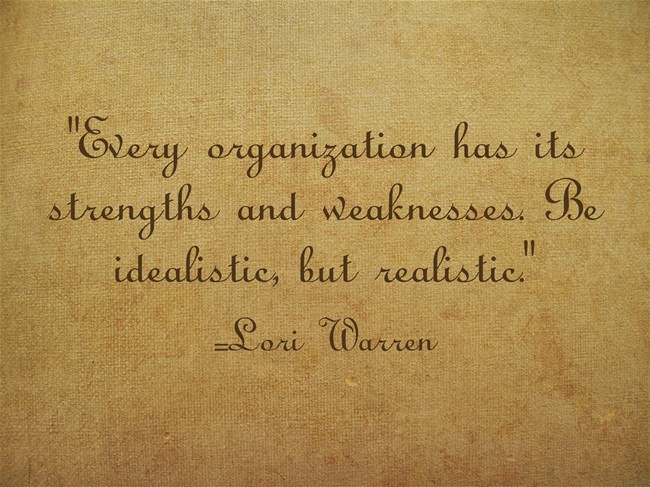Considering a career in nonprofit marcom? Advice from the pros
Specializing in nonprofit marketing communications is an exciting and rewarding career choice. It’s not for everyone, but those who do it seem to really love it. In recent months, I’ve had many conversations about advice to give those considering the specialty.
I decided to tap into our community’s collective wisdom and ask a number of pros for their input; as expected, some true gems emerged. Nonprofit marcom is a wonderful world of passionate, cause-driven work, full of opportunities for skill development and innovation. But it’s also a space where the days are long, expectations are high, resources (including compensation) are limited and burnout is a real risk! It’s a place with less layers of bureaucracy to navigate – or wait, is that more? And no matter how you look at it, nonprofit marcom involves a definite paradigm shift.
This post is for those readers with friends considering a move into the sector, those working in nonprofit but considering specializing in marketing or communications and those early-career folks evaluating their overall career path. However, there is also so much wisdom and insight for those already doing the work, you may want to check out what your peers are saying too!
Go in with eyes wide open
“Be clear about why you want to make the switch and be aware of the trade-offs. I moved from the for-profit to nonprofit sector many years ago, and most days, I am glad I did. But don’t assume just because you’re working for an organization dedicated to the greater good that everything will be rosy. Every organization has its strengths and weaknesses. Be idealistic, but realistic.
It’s also a good idea to volunteer for a nonprofit or join a board before you make the switch, to get an understanding of how they work. Just like for profits, nowadays nonprofits are competing for customers, and they are becoming more sophisticated about embracing strategic marketing principles. But it is a paradigm shift. So patience is key.”
-Lori Warren Senior Director of Marketing & Communications Jewish Community Federation of San Francisco, the Peninsula, Marin and Sonoma Counties
It’s about getting things done!
“If you are considering a career in nonprofit marcom, you have to have the mind frame where it’s not just about ideas. It’s all about moving forward, taking chances, capitalizing on opportunities; not being burdened, but acting fast on opportunities.”
-Suzanne Hallsworth Community Giving & Communications Director Oakville Hospital Foundation
Understand the role of marketing in nonprofit
“The advice I give most often is to realize that most nonprofits believe that marcom consists of two roles: a drive up window for on-demand orders for flyers and posts on the home page of the website, and press releases. The rewards are great if you can successfully make the transition, but do your due diligence on the leadership’s understanding of the role of marketing communications as a strategic function of the organization along with that of a service or operations only role. You’ll be glad you did.”
-Kerry Morgan SVP, Marketing & Communications United Way of the National Capital Area
“Marketing at a non-profit aligns to a distinctly different bottom line: mission. The dual bottom line of mission and revenue may be familiar territory for the for-profit experienced, but the execution is different. Marketing at a non-profit can be as robust as for-profit, but the affinity being suggested is to something altogether different. However, more and more for-profits are engaging consumers on values, and more and more non-profits are considering the consumer-like tendencies of their supporters – so the distinctions are getting blurrier.”
-Matt Shaffer Division Marketing Director The Trust for Public Land
Know how to work with limited resources
“The biggest differences I find between working in a profit and non-profit environment are the amount of resources that are available and the level of approvals that’s required or how quickly approvals can be granted for projects. However, they can both be rewarding experiences. It helps to develop good relationships with suppliers such as a print broker, so they could get the best pricing and quality, and meet your project deadlines. Within a non-profit organization, sometimes you are the marketing communications department so you need to have a range of skills and good project management abilities. I find that getting approvals can sometimes be faster within a nonprofit environment (depending on the request), and I can usually go straight to the main approver instead of waiting for several levels of approvers.”
-Siri Kousonsavath Marketing & Communications Coordinator St. Paul’s College, University of Manitoba
Be nimble and beware of burnout
“Choose the organizations or causes that arouse your interests the most. There are certain things people connect with and the sector can be a very fulfilling career choice. You may have more license for creativity, though budgets may be smaller depending where you work. And because lines blur between job roles, be prepared to be a Jane or Jack of all trades. Be nimble and flexible; it will end up being a skill set development opportunity.
Also, I was given a great piece of advice early in my career on the importance work life balance. Working in nonprofit often involves a great deal of passion and commitment. You need to make sure to give it your all, but also take time to recharge so that you can be the best you can be.”
-Marnie Grona Director, Marketing & Communications Imagine Canada
Know your motivations and whether the sector can deliver
“It’s important to take a hard look at what motivates you. I’m motivated by the rewards; I know that the work I do has an impact in my community. It’s tough to be in a role where you don’t feel recognized, which can happen if you are motivated by money or promotions, which can be limited in nonprofit.
Also, get experience in the private sector before going into nonprofit. My previous roles have broadened my frame of reference and given me an in depth understanding of how business works. Take the opportunity to learn from business.”
-Nicole Paterson Manager, Marketing Communications Burlington Public Library
Work for a cause that resonates
“There are many nonprofits out there. Do your research; talk to people in the industry and attend charitable events to determine if you can really see yourself in the sector and if a particular organization fits with your values. People tend to think that working in nonprofit is less work or not as intense. It’s very intense. The demands are the same, but with fewer resources. It’s great for a go-getter wanting to expand their skill set.”
-Randi Gill Communications Manager, Western Canada Canadian Diabetes Association
Cultivate your interests and relationships
“I think it’s important to be well-rounded. Not just in nonprofit marketing, but in any discipline. The things you encounter through your hobbies and other interests can often yield some rich insights or ideas that can be readily applied to marketing.
It’s easy to get sucked into the trap of being always on, checking Twitter and Facebook feeds, especially if you are responsible for monitoring social media for your organization. It’s important to also take care of yourself as well as your relationships. There will always be work to do, but there is also always enough time to take a break for a coffee or a tea to cultivate and maintain healthy relationships with colleagues, friends, and family members.”
-Jason Shim Digital Media Manager Pathways to Education Canada
What is your experience? What advice do you give to those considering a career in nonprofit marketing or communications? Please share in the comments!



 PRINT
PRINT
